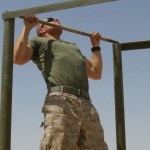People very often ask how many reps are required to build muscle, often believing that a particular rep range is going to produce the most desired results. As if, that rep range will do something out of the ordinary when compared to the others, fueling growth in a way that the others can’t. Think about that for a second, doesn’t a change in numbers in regards to the rep count seem rather insignificant in the grand scheme of things when it comes to building muscle? If we include it in the basket of vital things such as training intensity and diet, does it have a chance to stand on its own? The answer might strike some as very controversial, but the answer is no. Although the proper rep range is an important component of building muscle, it is not an important component in regards to helping fuel the muscle growth in the first place, but for other reasons. Therefore, the question of how many reps are required to build muscle needs to be examined in a different light. Let’s get to it.
The standard understanding for how many reps are needed to build muscle is best grasped when examining the boundaries set for the different priorities that different rep ranges are said to be geared towards. In other words, let’s look at this in numbers:
Strength = 1-5 reps
Building Muscle (hypertrophy) – 8-12 reps
Endurance = 15+ reps
The numbers above are the generally accepted standard for measuring the priorities you are gearing your body towards. Therefore, if you’re attempting to prioritize muscle building, 8-12 reps is the best rep range for building muscle. Now, if that’s all you were really looking forward to seeing, you can stop here. Without knowing anything else that will appear in the article, you will have an answer that will not deceive you in your goals if everything is else is on point (nutrition, intensity, etc.). However, we’re trying to understand this whole concept of rep ranges for what it is in the grand scheme of things, instead of for what it is claimed to be, so sticking around might be very beneficial. Understanding things in terms of how they fit into the grand scheme of things is better than keeping a narrow view and being exposed only to the bare minimums, which may or may not be entirely correct (such as this whole rep-range importance concept).
Now, the main gripe I hold with these set boundaries is simple. If someone is eating enough food to grow, do you honestly believe that doing 4 reps instead of 8 is going to lessen the amount of growth that the individual induces through training? No, even if those 4 reps are more geared towards the adaptation of the central-nervous system due to a priority towards strength, they will see results as long as they are going to the limit and giving their body enough nutrients to grow through food. Here’s where the key concept many times overlooked comes in, going to the limit means achieving muscular fatigue. How many reps to build muscle is irrelevant in attaining this ultimate goal, in the sense that any rep range can help achieve it. The concept of putting on muscle size stems from Progressive Overload, where you attempt at each training session to move up from your previous training session in any manner possible (1 rep more than last time, less rest than last time, etc.). For a detailed look, check out that article. The point is, you induce growth through muscular fatigue. When your muscles are pushed to the limit, your body adapts by making them bigger (of course, if you feed it right).
The rep range to build this muscle is therefore irrelevant in terms of inducing that growth, it is not the rep range that does this directly. Meaning, doing 8 reps instead of 4 is not going to make you reach muscular fatigue any more than the other. People constantly overlook this. If 4 reps on the bench press tax your muscle to its limit, you have achieved your training goal for that session. If 15 reps tax your muscle to its limit, you have achieved your training goal for that session. This is why rep range is not the end all, be all necessity to building muscle. The same can be said for those attempting to gain strength. If I’m doing 10 reps of 40lbs, and 3 months later I’m doing 50lbs for 10 reps, I have still gained strength. The mix-up in regards to this matter comes from a false understanding of the scope of the situation we’re discussing. Here’s the common example:
“If you do 20 reps on bench press, you are only working endurance. You will not see substantial muscle growth over time” <- this is indeed correct, if that individual is not reaching muscular fatigue at rep 19-20. If he/she does 20 reps and could keep going, it is indeed an endurance workout. However, if their last few reps push them to their limit, they are training to build muscle. Their muscle is being taxed to its limit, forcing the body to adapt. How many reps to build muscle is therefore irrelevant. It is important in terms of time efficiency, not because it directly contributes to a particular goal (due to that particular rep range). Is it optimal to do 20 reps for strength gains? No, over time though, if you always train to the limit, will you achieve strength gains? Yes, as long as you are always taxing your muscle to the limit higher and higher with each workout as it adapts.
As you can see, how many reps to build muscle can be answered up at the top of the article. Stick to 8-12 reps, and you’ll be well on your way. However, understanding why that is not a black and white concept is important for those who really want a true understanding or are curious people in general. This is especially relevant to those who may find themselves on vacation or at home and don’t have access to the gym and high weights. Most automatically give up because they know that doing bodyweight exercises or small weights that push them past 12 reps will be mostly useless. Far from it. They just have to spend more time bringing their muscles to their limits, due to the lower amount of stress based on the lower weight they are taxing the muscle with. A workout that may take 45 minutes with 60lb dumbbels, is going to take longer with 30lb dumbbells but the same result can be achieved. That is the key. You might have to do 25 reps till your muscle can’t take anymore, as opposed to 10 reps, but the only thing different in the end will be the amount of time you have spent doing that particular set (the longer repped set obviously taking longer).
In conclusion, there’s really no reason to stop using the standard pre-set rep ranges for the specific goals you’re looking to pursue. However, if you find yourself in a position where you can’t do that particular rep range (whether it’d be for those recovering from an injury and doing lighter sets, or being away from the weights necessary to stop at 4 or 10 reps, etc.), you can still push your body to the limit. It is not the rep range that builds muscle, the rep range is only the catalyst for taxing your muscle to the limit. That is the key concept to building muscle, muscular fatigue. How you reach it is up to you, as long as you do. The results will come from there. In this grand scheme of things, how many reps to build muscle doesn’t seem so influential, does it? Visit our gain muscle article for more on how you can enhance your training and really get results. Good Luck!
Incoming search terms:
- how many reps for size
- how many reps to build muscle
- how many reps should i do to build muscle
- bench press reps
- how many reps for mass
- how many reps for strength
- bench press reps for mass
- how many reps and sets to build muscle
- how many reps for bench press
- bench press how many reps








As a Newbie, I am constantly exploring online for articles that can benefit me. Thank you
What is not mentioned here is that it is a function of load lifted and fitness of the athlete.
For an untrained person in order to gain strength maximum gains can be seen at levels as low as 40% of 1rm. However the elite level athletes require over 80% to gain any training effect. The key is not fatigue but amount of muscular tension and time to build strength and time under tension for size. Hence a multiple set low rep performs better for athletes than a 3 set of 8-12 reps.
Muscle failure/fatigue is actually undesirable: for example the Bulgarian Olympic weight lifting team lift 6 days a week an perform exercise over Thr whole day and they are way stronger than us mere mortals. By this articles logic they would not get any stronger as they haven’t fatigued the muscle.
The author should look at the difference between sarcoplasmic and myofibrular hypertrophy as well as all muscle gains are not equal that is partly why body builders are huge but have low levels of relative strength compared to other trained individuals.
The Bulgarian Olympic team is not representative of the average individual attempting to put on size through weight training.
It is true methods of training must often change as an individual has gone through years of intensive lifting and requires every bit of creativity to make further progress. However, the basic principle stays the same. Your body needs to be stimulated to repair and grow stronger/bigger, that stimulation comes from reaching muscle fatigue.
Recruiting different fibers based on particular rep ranges (hence, sacro and myo activation) does not change the fact that each level of fibers is to some extent activated (regardless of rep range).
As a result, with proper nutrition the rep ranges are largely irrelevant as long as you are able to tear your targeted muscle each session and progress over time.
Can you focus “more” on strength? Yes, with lower rep ranges. However, you will still gain size if you eat in a caloric surplus. (vice versa)
The example of bodybuilders being huge yet not proportionally strong is flawed. Perhaps they are not strong via an Olympic lifter, but that individual has been training and adapting his body specifically for those types of movements (especially factoring his CNS adaptation over time). Bodybuilders are nonetheless able to lift much more weight relative to almost all others.
agreed.
That’s the key. If your lifting to build muscle then you need to lift heavier and do fewer reps.
As for endurance, the author has a strange opinion of what that word means. He says ” If he/she does 20 reps and could keep going, it is indeed an endurance workout” and that’s ridiculous. The very meaning of the word endurance is to push your limits. It is not this watered down concept of “doing things lots of times” that the author has presented. Where I’m concerned, anything to failure is an endurance workout.
Anyways, I was just glad to see your comment. Good to see something I can agree with on this page.
I understand the concept of going to muscle failure, and that it can be achieved through almost any amount of reps. So my question is what is the difference if you go to muscle failure at ~6 reps, at ~10 reps, and say about ~15 reps. Obviously you’d have to use more weight at 6 and 10 reps to reach the same muscle failure as with 15 reps. But what is the difference in muscle growth/strength between these different workouts.
Quick Summary Answer:
Although every rep count will, to some extent, stimulate each particular muscle fiber, each rep count has its emphasis area. For example, training in the 6-10 rep range will place a focus on sarcoplasmic hypertrophy, the main effect of which is not enlargement of the muscle fibers themselves but an increase in the fluid that surrounds them. That’s why people who want to look “fuller” or “bigger” focus their reps in this range.
On the other hand, those focused on training the Central Nervous System (CNS) and enlarging the actual muscle fibers will place a focus on myofibrillar hypertrophy, with reps ranging from 2-5.
Therefore, ideally, an individual should incorporate both rep ranges into their workouts. That is why often beginners are told to focus on big lifts and low reps to adapt their CNS to these new stress loads, along with allowing them to build a solid base which they can later use to focus on greater “visible” muscle growth by training in the higher rep ranges. Of course, as mentioned in the article, if you eat properly either one will allow size gains.
The more stress on your muscles the more hormone release! The less stress the less u grow. I’ll keep getting my gains with hard ass stressful workouts for all that hgh and test release. I guess people don’t know this, good luck with 4 reps. Lol